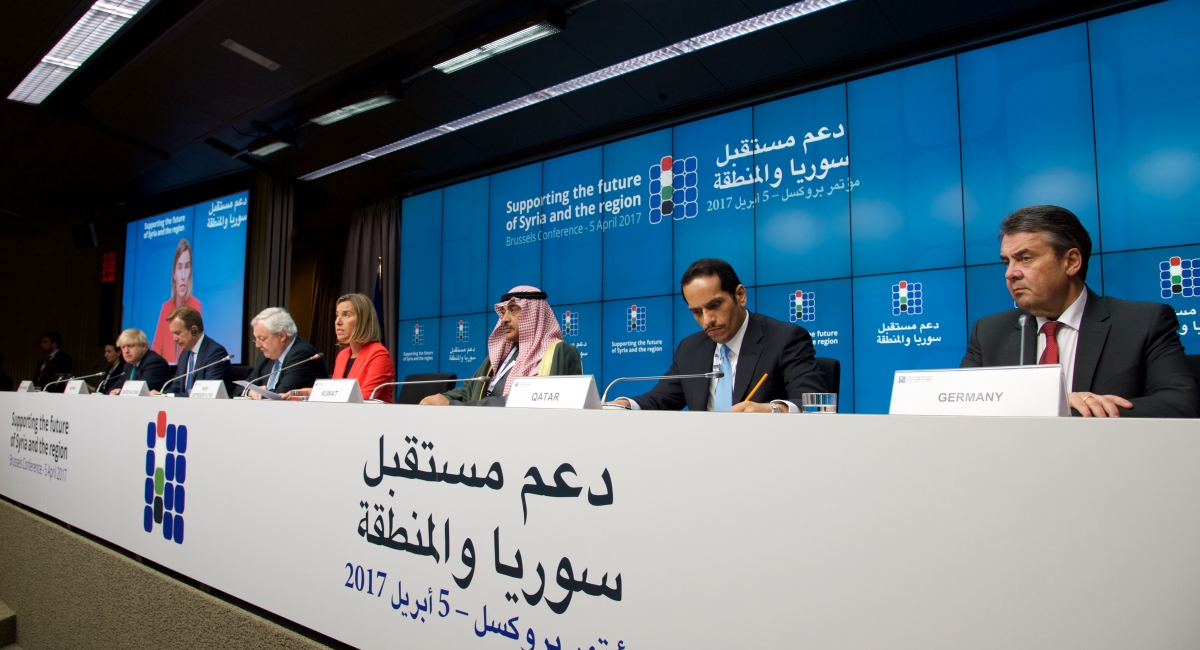Syria: Diplomacy in Disarray

The situation in Syria is desperate, while the diplomacy surrounding it is getting more tangled by the day. Is there a role for the European Union in the quest for a settlement to the Syrian war, in line with its commitment to crisis management?
Ahead of a donors’ conference held in Brussels on 4-5 April, the European Commission and Federica Mogherini, the High Representative for Foreign Affairs and Security Policy, published a joint communication under the title “Elements for an EU Strategy for Syria”.
The Council adopted the strategy with its own complementary conclusions, and the EU’s aim was to seek endorsement for it at the conference, thereby defining internationally how the EU could play a bigger role in the existing UN-agreed framework for peace, help build stability and support post-conflict reconstruction once a credible political transition is underway. But before the conference had even begun, a chemical attack on Khan Sheikhoun threw the EU’s new strategy into disarray.
In a recent CEPS Commentary, Steven Blockmans (CEPS senior research fellow who works on the EUNPACK project) and Astrid Viaud write: “The military and political fall-out of the chemical attack on Khan Sheikhoun has delivered an immediate blow to the EU’s strategic aims, which were to be served by the donor conference in strengthening international support for the UN-led political process. The failure of the EU to attain this political objective works to the obvious benefit of Bashar al-Assad and his overlords in Moscow and Tehran, who are engaged in the Astana talks with Turkey and its Syrian proxies to determine the conditions for a ceasefire to the conflict.”
This diagnosis seemed to be confirmed by subsequent events. On May 4th, Russia, Iran and Turkey signed a deal in Astana to create so-called "de-escalation zones" in Syria, prompting some rebels to denounce the deal which sidelined both the EU and the UN’s own process in Geneva. The idea of de-escalation zones smacks of the infamous ‘safe areas’ established under UN auspices during the war in Bosnia and Herzegovina, which turned out to be all but safe. However, while the UN was ultimately unable to protect the Bosnian safe areas, Syria’s de-escalation zones lack even the most basic monitoring – let alone enforcement – mechanism since Syria has rejected any role for outsiders such as the UN.
In light of these developments, the EU’s leadership role in mobilising humanitarian funding (representatives of more than 70 countries and international organisations at the donors’ conference pledged €5.6 billion for this year and an additional €3.47 billion until 2020) is stuck in a strategic vacuum, with no complementary political process to speak of except the Astana talks, dominated by the regional powers directly involved in the Syrian war.
Blockmans and Viaud argue that in light of this diplomatic reality, the EU should focus on supporting accountability for war crimes. The EU Council concluded that those responsible for violations of human rights and international humanitarian law “must be held accountable”, and the co-chairs of the donor conference called for the implementation of UN General Assembly Resolution 71/248 establishing an International Impartial and Independent Mechanism (IIIM), an initiative by Liechtenstein and Qatar. “Given that alternative paths towards international criminal accountability are currently blocked, the creation of the IIIM is a valuable step towards transitional justice for Syria and deserves support,” the authors write. Yet the EU, a conference co-chair calling for support for the IIIM, has not yet provided any financial support. By remedying this failure, the EU could take a step towards a better future for Syria even as its other crisis response mechanisms remain blocked.

